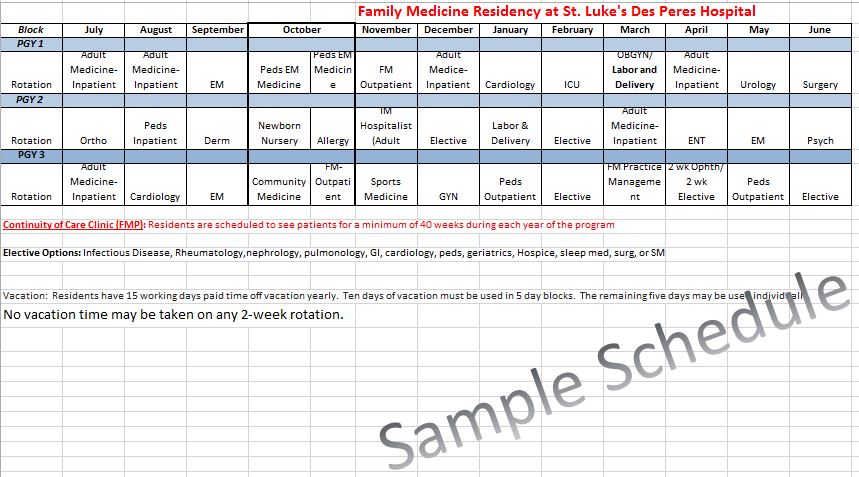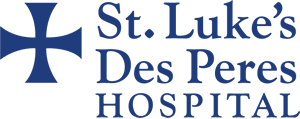St. Luke’s Des Peres Hospital Family Medicine Residency Program
Program Summary
Resident Complement
The SLDPH FM residency is approved for 12 residents. In 2023-24, the complement is:
PGY-1 4
PGY-2 4
PGY-3 4
Curriculum
St. Louis is a city rich with graduate medical education opportunities. With many of our own graduates practicing in the local community, we have the faculty strength needed for a residency which is primarily ambulatory. We follow the ACGME Program Requirements for Family Medicine. In addition to the monthly rotation requirements, residents develop their own panel of patients at the FMP (Cedar Hill Primary Care). PGY-1 residents start with ½ day per week; PGY 2 & 3 residents advance to three (3) ½ days per week. Additionally residents participate in the care of nursing home patients at Big River Nursing and Rehabilitation Center which is adjacent to the FMP. Between these two sites, the residents easily achieve the 1650 in-person FMP patient encounters required by the ACGME.
Core Curriculum
Residents have a number of daily, weekly and monthly didactic experiences:

Research Accomplishments
Under new ACGME guidelines, the Residency has developed a rotating model whereby each year, a different core faculty member serves as the research facilitator for the PGY-2 class beginning in July. During that year, the core faculty members work with the residents either on individual research projects or the class as a whole to design, develop, research and analyze a scholarly activity project. Resident core curriculum includes a QI and Research course.
The SLDPH FM residency is approved for 12 residents. In 2023-24, the complement is:
PGY-1 4
PGY-2 4
PGY-3 4
Curriculum
St. Louis is a city rich with graduate medical education opportunities. With many of our own graduates practicing in the local community, we have the faculty strength needed for a residency which is primarily ambulatory. We follow the ACGME Program Requirements for Family Medicine. In addition to the monthly rotation requirements, residents develop their own panel of patients at the FMP (Cedar Hill Primary Care). PGY-1 residents start with ½ day per week; PGY 2 & 3 residents advance to three (3) ½ days per week. Additionally residents participate in the care of nursing home patients at Big River Nursing and Rehabilitation Center which is adjacent to the FMP. Between these two sites, the residents easily achieve the 1650 in-person FMP patient encounters required by the ACGME.
Core Curriculum
Residents have a number of daily, weekly and monthly didactic experiences:
- Journal Club – Held monthly. Presenting interesting articles related to FM topic, followed by discussion and review of contemporary state of knowledge.
- Family Medicine Grand Rounds – Held monthly with a 4 hour of protected block time. Family Medicine clinical case presentations and topics are followed by discussion and review of current knowledge of topics.
- Grand Rounds – Held weekly at St. Luke’s Chesterfield and presented by SLC faculty – Case presentations and topics are followed by discussion.
- While on rotation at the FMP, morning and noon didactic presentations are presented and facilitated by the core faculty.
- Board Review: Monthly review utilizing the TrueLearn on-line program consisting of 1000 ABFM style question and answer explanations. Facilitated by faculty.
- Case/Topic Conferences – Held Weekly. Residents present interesting cases and/or topics. It involves presenting patient history, case formulation and discussion of clinical care based on evidenced-based medicine.
- Reading Club – Forum for residents to explore and analyze evidence pertinent to the content of family medicine emphasizing outcomes-oriented, evidence-based studies. A Family Medicine text book is selected each year and rotated so that three different texts are reviewed throughout the residency.
- STFM Core Curriculum (Society of Teachers of Family Medicine)– three times per week-- faculty lead lectures following the STFM curriculum. Membership to STFM is provided to all residents and faculty.
- OMM – two monthly OMM learning opportunities are designed to allow for assessment and hands on practice.
- KCU GME Core Curriculum: Prior to graduation, all residents must complete the following: 1. American Medical Association (AMA) GME Competency Education modules, as assigned by your Program Director. The AMA curriculum covers the required ACGME Core Competencies. 2. Research Methodology: Working with KCU GME research and QI coordinators, residents will learn the foundations of research. Residents complete two scholarly activities, at least one of which must contain components of quality improvement. The results of those activities will provide the basis for oral or poster presentations, which will be presented at an appropriate regional or national conference, and/or be suitable for publication in a peer-reviewed journal.
- Productivity Meeting/Business Practice Management (Practice Habits) Held quarterly. Residents receive reports of individual and practice productivity, financial performance and clinical quality as well as training to analyze these forms. Faculty are present for open discussion about the FMP and practice habits of the residents.

Research Accomplishments
Under new ACGME guidelines, the Residency has developed a rotating model whereby each year, a different core faculty member serves as the research facilitator for the PGY-2 class beginning in July. During that year, the core faculty members work with the residents either on individual research projects or the class as a whole to design, develop, research and analyze a scholarly activity project. Resident core curriculum includes a QI and Research course.

